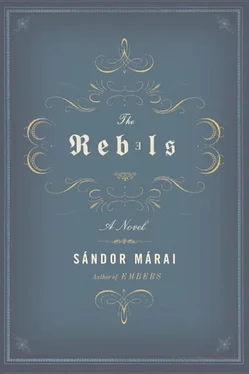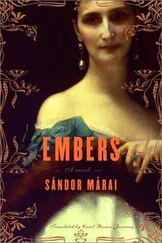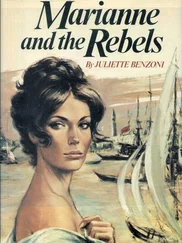He gazed at the empty bottle, pushed it away with disgust, and walked round the table.
“Unfortunately by that time the actor has a bad reputation,” he said, stopping in front of them and crossing his arms. “He is being watched. Someone from the theater might be keeping an eye on him. Or maybe someone else. They report him and the young gentlemen would be ruined if there proved to be a witness to that private—should we call it—performance. The young gentlemen continue to be subject to the authority of their parents and others senior to them. A witness, someone who knows the problematic affairs of the young gentlemen, could bring about a situation of the utmost unpleasantness. The young gentlemen would never be able to face their kind parents and relations again.”
Tibor was slowly backing away towards the door. He hadn’t said a single word throughout the pawnbroker’s speech, but now he swallowed and stuttered.
“What do you want?”
Silence.
“Ábel!” He leapt over to him, seized him, and shook his arm. “Speak!…What’s going on?…What does the man want?”
Ábel put his finger to his neck as if adjusting his collar before saying anything. The pawnbroker smiled.
“Havas has a heart. The position is clear to the young gentlemen now. Extraordinary boys like these, thought Havas, were certain to call at your den sometime. You must amuse them as best you can. Now here they are.”
He surveyed them, still smiling.
“Havas is ready to oblige the young gentlemen. Until, let us say, tomorrow night. Master Prockauer can put the pawn ticket related to the family silver back in his pocket. Tomorrow, at this time, shall we say, I would be pleased to see the young gentlemen with or without the money. In the meantime I wouldn’t want to spoil tonight’s entertainment. The young gentlemen should think the matter over and do what seems sensible to them. Havas is not going anywhere, he is not to be moved, he sits here like a rock. His financial circumstances, his physical condition, tie him to the place. One at least of the young gentlemen’s friends can reassure them that Havas is always friendly and generous. His personal relationships are, as ever, first rate. The young gentlemen should act according to their perception of the situation. Havas doesn’t like shady deals. He is perfectly open, has nothing up his sleeve. It is up to the young gentlemen to decide.”
He looked around.
“You can’t hear the rain now. If the young gentlemen would like to take their leave now…”
He opened the door.
“I bid you a pleasant evening. Till tomorrow, at the same time.”
He courteously ushered them through, bowed a little stiffly and painfully. They heard him turn the key in his door as they stood in the stairwell.
THEY WAVE DOWN A CARRIAGE AND ASK TO BEtaken to The Peculiar. They draw up the carriage hood and sit in the cabin that smells of mice, not too close to each other, hearing the rain’s gentle pitter-patter on the leather above them. Ábel is shivering. It has just occurred to him that he has not had a proper wash for twenty-four hours, has not changed his underwear or eaten hot food. His teeth are chattering as he sits in the corner, the carriage bumping over the uneven cobbles, opening his eyes whenever there is a particularly violent jerk to see the wall of some house, a pile of stones, the trunk of poplar, a garden fence. It seems to him that this is the longest journey he has ever made. They are just passing the cobbler’s wall when he feels Tibor’s hand on his. Ábel, croaks the colonel’s son. What is this? Are we dreaming? The wheels of the carriage rumble on. Ábel would like to answer but hasn’t the strength to shout over the noise of their passage. He weakly raises his hand to indicate that he wants to say something but can’t find his voice. Do you believe it? asks Tibor. Ábel mouths silently back at him. What? He is cold and shivering, yet is seized by hot flushes. His teeth continue to chatter. He feels feverish. Do I believe what he says about Ernõ? About us? Is it true? He can’t answer. He closes his eyes.
They stop the carriage near The Peculiar and walk over swollen muddy fields. Everywhere there are fruit trees devastated by the storm. In the plowed furrows there is the delicately sprinkled sparkle of ice. They make their way across the field, muddy themselves, reeling a little, pass the fence, avoid the garden by entering through the back door, and steal up the stairs to their room.
The room is still as Ábel had left it that morning. He walks uncertainly to the window, closes the shutters, and collapses on the bed. Tibor sits down at the table. There’s no one in the garden. Lanterns, painted scraps of paper, hang soaked and useless on wires. Overturned tables. A shroud of mist descends from the pines. But there is a rumble and a clatter from the hall below: conversation, the clinking of glasses rise through the floorboards. The picnic crowd must already be here, sheltering in the dimlit restaurant. The damp fog settles and darkens into evening. Tibor glances at his wristwatch. Half past six. They spent over four hours with Havas.
“Answer me now, Ábel,” he says, his elbows on his knees, leaning forward. “What did you know of all this? What’s this about? Did you know about Havas, the actor, and Ernõ?…”
Ábel hears the question as from a vast distance, his eyes are closed, his arms and legs spread wide. It takes a great effort to sit up, then he feels about on the bedside table and lights what’s left of the candle he had used the previous night. The room is dark by now.
“I knew nothing,” he says slowly, his tongue heavy in his head, half-asleep. “I told you all I know this morning. There are no secrets. There’s nothing in any of this that we should keep quiet about.” Nevertheless, he falls quiet for a while. Then, uncertainly but more animatedly he continues.
“Did it never occur to the rest of you that Ernõ was always talking about something else? It’s hard to describe, but whenever I said ‘tonight,’ or ‘pen,’ or ‘person’ and he repeated the words ‘tonight’ and ‘pen’ and ‘person’ he meant something else by it. I often feel this way when I’m with strangers. I never felt it with you, not even when you didn’t understand what I was saying. With Ernõ I felt it all the time. Something separated him from us.”
The colonel’s son reached over for the tin of tobacco lying on the table, rolled a cigarette in his trembling fingers, leaned over to the candle, and lit up.
“So you knew nothing?” he asked, his mouth dry.
“Nothing.”
“And what you said to me this morning?…”
Ábel props himself on his elbows and with a new kind of carelessness, with a curious joy and sense of liberation, answers: “That I loved you? But of course I love you. But wait, Tibor. I am just beginning to understand. I love you, I like looking at you, there were secrets we shared, and so we told each other more or less everything we could tell. Or at least I did…I don’t have anyone else. Auntie, poor thing, the servant, and Father, and, well, you know all about him. One day perhaps, if we are still alive, once I have forgotten everything, he and I will be friends. I don’t know. Wait, maybe I can explain it to you now. I was jealous of you too. I wanted you to be my friend, mine alone, not Ernõ’s or Béla’s or the actor’s, none of whom were worthy of you. Of course I loved you. It’s not what Havas was talking about though, Tibor, not at all. I know that now. And I prayed for you. I have a special friend you don’t know about, the mandarin, who is disinterested and fair. I prayed that you should remain young, handsome, graceful, light in spirit, and that you should escape the filthy struggle in which our brothers and fathers are currently engaged. I prayed you should always be as elegant and refined as you are now, that you should suffer no crisis of doubt, that nothing should trouble your conscience; that you should always blush when someone addressed you. And loving you was a painful feeling, agony and humiliation, but there was nothing sly about it. Nothing. Do you believe me? And now, after all this, I no longer know if at bottom—that is, at some depth I cannot see—everything was in fact as simple, pure, and well-meant as I had thought it to be. But I knew nothing about any such arrangement, Tibor, believe me. You and I, we had to be together because something was drawing us that way. To me you were beauty and friendship, the ideal if you like, but never fear, I never thought of you that way. Maybe I would have liked to touch your hair, but that was all. No, no, no!” he cried and stood up. “Oh, Tibor, what has happened? Why is this happening to us? Look round this room, these things we stole, the things we said, all the games we played here. Can’t you see what it was all about?”
Читать дальше












